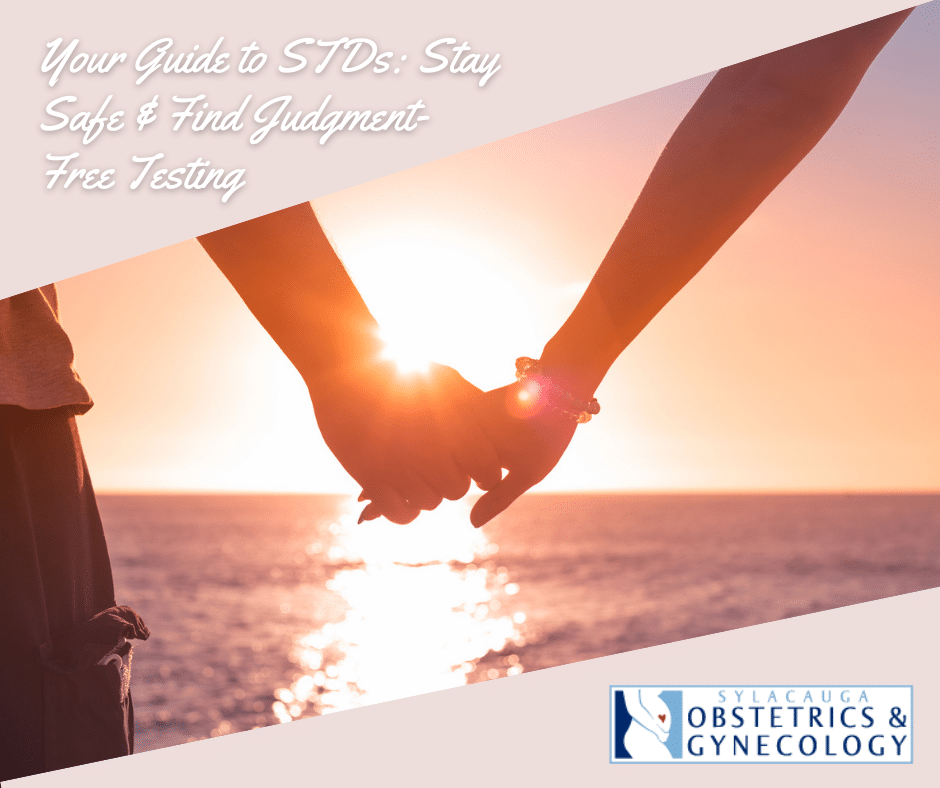
01 May Your Guide to STDs: Stay Safe & Find Judgment-Free Testing
As of early 2024, Alabama ranks #7 out of the 10 states with the highest rate of sexually transmitted diseases (STD). In fact, the total STD rate in Alabama is 934.7 per 100,000. Because our state ranks so highly when it comes to the rate of STDs, we’ve decided to put together a guide to everything you need to know about STDs in Alabama. This guide isn’t meant to frighten you, but instead empower you to make smart choices and protect yourself against disease.
STDs are a prevalent yet often misunderstood aspect of sexual health. In this guide, we’ll cover everything about STDs, including the basics of common STDs, prevention methods, and common myths.
Understanding STDs
STDs, also known as sexually transmitted infections (STIs), are infections transmitted through sexual activity, including vaginal, anal, and oral sex. Here in Alabama, chlamydia and gonorrhea are the two most common, though they are far from the only two that young men and women need to protect themselves from.
Other common STDs include:
- Syphilis
- Genital Herpes
- HPV (human papillomavirus)
- HIV (human immunodeficiency virus)
- Hepatitis B and C
Signs It’s Time for STD Testing
If you or your partner show any of the following signs or symptoms, please visit your friendly OB-GYN for a judgment-free checkup:
- An unusual sore
- A smelly discharge
- Burning when peeing
- Bleeding between periods
A Closer Look at the Most Common STD in Alabama: Chlamydia
612.1 per 100,000 people in Alabama had chlamydia as of an early 2024 report. Chlamydia is caused by an infection among both men and women. This common STD can damage a woman’s reproductive system permanently, which could make getting pregnant difficult or impossible. It can also cause ectopic pregnancy, which is a life-threatening pregnancy that occurs outside the womb.
Symptoms of Chlamydia
Chlamydia sometimes has no symptoms, but women’s symptoms may include the following:
- Abnormal vaginal discharge
- Burning sensation when peeing
- Rectal pain
- Rectal discharge or bleeding
Men may experience the following symptoms:
- A discharge from their penis
- A burning sensation when peeing
- Pain and swelling in one or both testicles (although this is less common)
There is an effective treatment for chlamydia that can cure the infection. Patients must take all of the medicine given by their healthcare provider. If the medication is taken correctly, it will stop the infection and reduce further issues, but it will not undo any permanent damage caused by the disease.
It is common to get a repeat infection with chlamydia, so people who have had it should get tested again about three months after the treatment.
Gonorrhea: What You Need to Know
261.7 per 100,000 people in Alabama were infected with gonorrhea as of an early 2024 report. This STD infects the genitals, rectum, and throat and is very common among young people ages 15-24. Like chlamydia, this infection is bacterial, and it can have long-lasting effects on your health and fertility if not treated promptly.
Symptoms of Gonorrhea
Gonorrhea may not have any symptoms, and when they do appear, they are often mild and mistaken for bladder or vaginal infections. Women should visit their doctor anytime they notice:
- Painful or burning sensation when peeing
- Increased vaginal discharge
- Vaginal bleeding between periods
- Discharge
- Anal itching
- Soreness
- Bleeding
- Painful bowel movements
Men may also experience the following symptoms. If you are aware that a sexual partner has these symptoms, it’s important to get checked:
- A burning sensation when peeing
- A white, yellow, or green discharge from the penis
- Painful or swollen testicles
Treatment can cure gonorrhea if you take all of the medication provided. The medication will stop infection, but it will not reverse permanent damage caused by the disease.
Treatment for gonorrhea gets harder every year because drug-resistant strains of the disease are increasing. If symptoms continue after treatment, patients should return to their doctors for further treatment.
STD Prevention Methods
Chlamydia and gonorrhea are the most prevalent sexually transmitted diseases in Alabama, but these infections can be avoided using easy prevention methods.
Here are four prevention methods to help protect yourself against STDs:
- Condom Use: Consistently and correctly using condoms during sexual activity can significantly reduce the risk of contracting STDs.
- Regular Testing: Getting tested regularly for STDs, especially if sexually active with multiple partners, can help detect infections early and prevent transmission.
- Vaccination: Vaccines are available for certain STDs like HPV and hepatitis B, offering long-lasting protection.
- Open Communication: Honest and open communication with sexual partners about STDs and testing history is crucial for maintaining sexual health and can ensure safety for you and your partners.
5 Common STD Myths Dispelled
There is a lot of misunderstanding surrounding STDs, which leads to dangerous myths about these illnesses. Let’s put these myths in order and look at the facts so that you can stay safe.
Myth: STDs only affect promiscuous individuals
Fact: STDs can affect anyone, regardless of the number of sexual partners. Transmission can occur even with just one sexual encounter.
Myth: You can’t get an STD if you’re in a monogamous relationship
Fact: STDs can still be transmitted within monogamous relationships if one partner is infected or if there has been previous exposure.
Myth: STDs are always accompanied by symptoms
Fact: Many STDs can be asymptomatic, meaning infected individuals may not experience any signs of infection. However, they can still transmit their infection to other people.
Myth: You can’t get an STD from oral or anal sex
Fact: STDs can be transmitted through various sexual activities, including oral and anal sex. Using protection like condoms is essential in preventing transmission.
Myth: You can’t get an STD if you use birth control pills
Fact: Birth control pills, patches, and IUDs effectively prevent pregnancy, but they do not protect against STDs.
Visit Sylacauga OB-GYN for Judgment-Free Testing
Understanding STDs, practicing prevention methods, and dispelling common myths are essential steps in promoting sexual health and reducing the spread of infections. By educating ourselves and getting tested often, we can work toward creating a safer and more informed community.
At Sylacauga OB-GYN, we ensure you stay informed and provide support when needed. As part of our continued support to our patients and community, we will always offer judgment-free testing and treatment for STDs.
Visit Sylacauga OBGYN for Judgment-Free STD Care
If you think you may have an STD or would like treatment to ensure safety for yourself and your partner(s), Sylacauga OB-GYN in the Coosa Valley Area has an experienced and caring team of healthcare providers to provide judgment-free testing. Contact us online or by calling (256) 510-7163 to schedule an appointment and take the first step towards managing your health with compassion and expertise.


